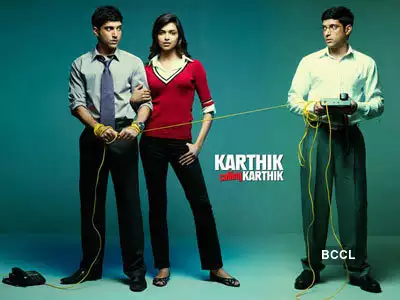After an excruciatingly painful first half of 60 minutes, which could have been shorter or craftier, the film really kicks in. KCK is the story of Karthik (duh), a timid man, bullied around by everyone who gets much-needed help by therapeutic phone calls from himself.
As bizarre as it may seem to get calls from himself, which have no existence on his phone records, he goes with the flow and trusts the caller. His life turns around in a few weeks. But all good things come at a price. When he accidentally lets slip the secret of his success, everything unravels. It’s up to his girlfriend and his psychiatrist to figure out who is this mystery caller and if Karthik is all right in his head.
The execution of the second half of the movie is pretty good. If only the same effort and class applied to the first half, full of clichés, lame songs, and over-the-top acting by both Farhan Akhtar and Deepika Padukone. I have always liked Akhtar, but he has some major dialogue delivery issues in this movie. For a role that was this emotionally intense, a good voice actor would have done a better job.

Karthik Calling Karthik Stills
I am noticing this new trend in Indian movies that I find really disturbing. Characters switch to lengthy dialogues in English, where the movie does not provide subtitles. I understand English has become part of the spoken, urbane language in Indis. The producers may target the multiplex audience, but it’s disrespectful to everyone else. If it’s a Hindi language movie and extensive phrases are being used in another language, then subtitles must be used.

Karthik Calling Karthik Movie Stills
The other thing that I found really strange was Padukone’s character development. The idea was to show her as an outgoing, modern, and independent girl. She smokes and knows her scotch.
I am not getting into a discussion if that is an accurate representation of a modern woman. It is the way it was portrayed in the movie that was so juvenile. Padukone’s character, Shonali, walks into her office (which, like most modern office spaces, has transparent glass walls), sits back in the chair takes out her cigarette smiles, and smokes. I have seen nothing sillier. I don’t smoke but any smoker will tell you that if you do that in today’s workplaces, that’s bound to set off the smoke alarm, and if you wanted to smoke the first thing in the morning, you would have done it outside. The second incident is when Karthik and Shonali are in a pub, and Shonali asks for a drink, they have an extended discussion on why her drink is not juice or soda but alcohol. It’s like hitting the viewers over the head with a hammer and saying–“Look, she is so modern – she smokes, she drinks”. Why do Indian directors insist on repeating these clichés and shoving them down our throats in such unsubtle ways? Why?

The movie was not short on stupidity on a whole, but somewhere in the last 40 minutes it became a psychological thriller, which made the experience of watching it marginally worthwhile.
Click here for more TV & Movies review.



2 comments
Couldn’t agree more! Think the retarded phone instrument needs a mention too. That was an important character too!
Of course, director and story writer used Schizophrenia to really create a thriller which is quite disrespectful in a way. Movies like this are really helpful in creating stigmas around little known and less understood psychological disorders. Overall it was really average and a disaster for someone who gives up by interval.
Ha ha..ya I wonder why that brand of phone. I am not sure if schizophrenia was used in a way that was disrespectful to people who suffer from it but it definitely was not sensitive